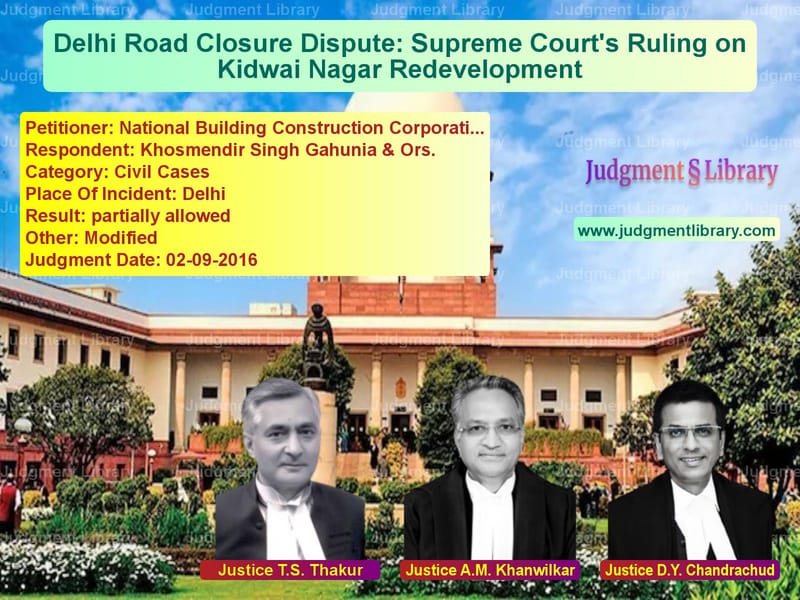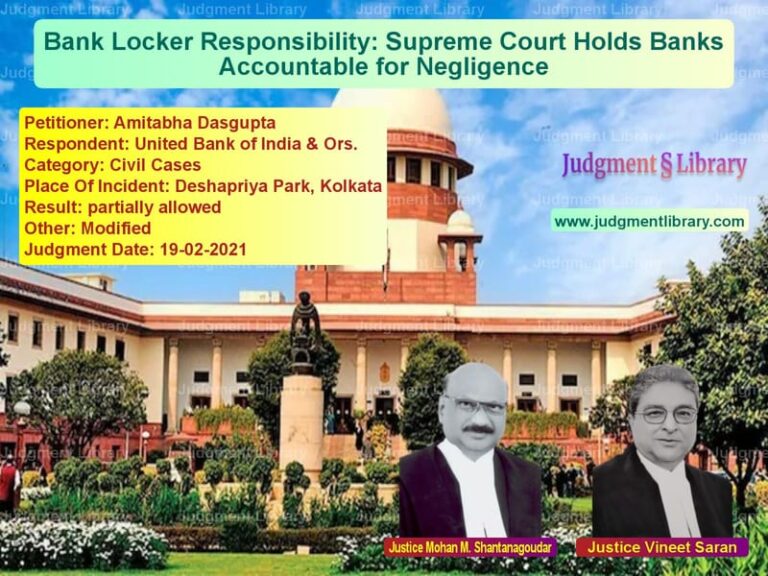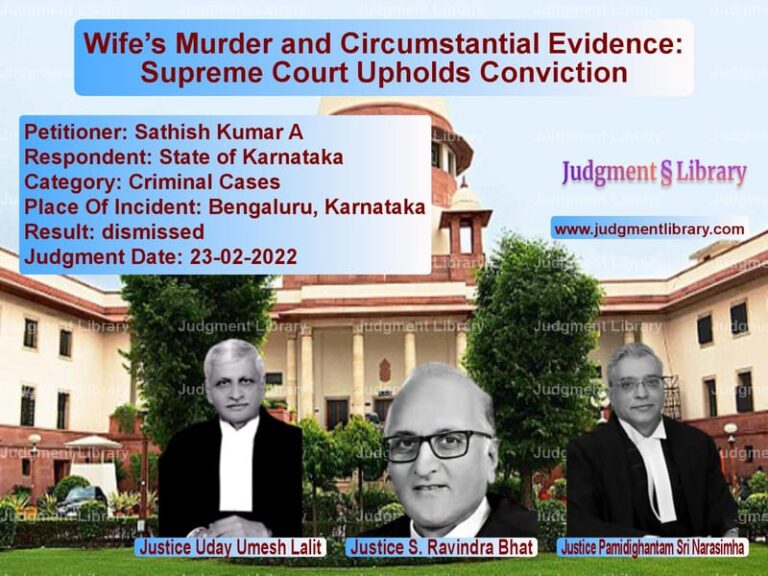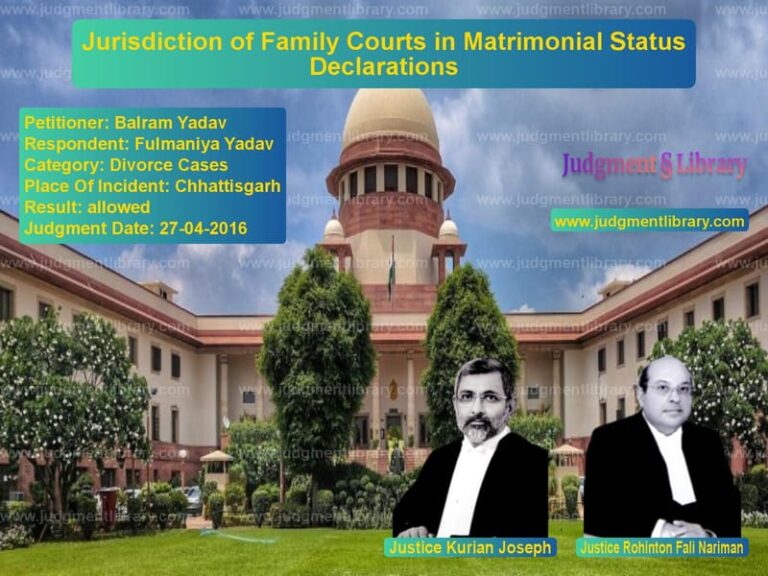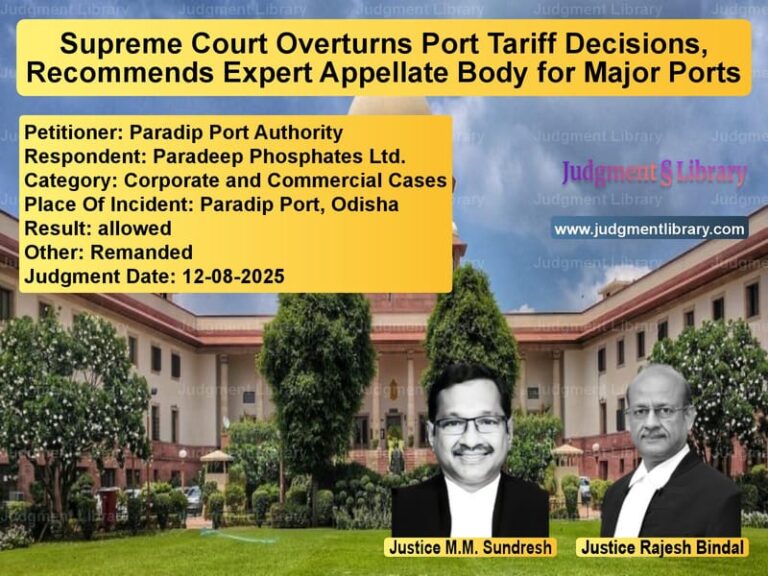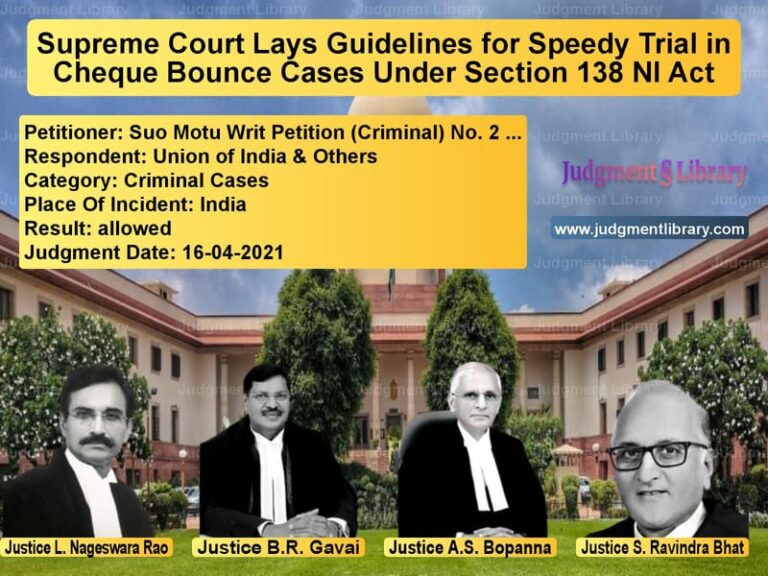Delhi Road Closure Dispute: Supreme Court’s Ruling on Kidwai Nagar Redevelopment
The Supreme Court of India adjudicated a significant case concerning the closure of a road in Kidwai Nagar East, Delhi, due to the redevelopment project managed by the National Building Construction Corporation (NBCC). The case revolved around whether the closure of Veer Chandra Singh Garhwali Marg was legally justified and if public inconvenience was adequately addressed.
Background of the Case
The Delhi Development Authority (DDA) issued a Zonal Development Plan under the Master Plan of 2021, earmarking Kidwai Nagar East for redevelopment. The colony, spanning 86 acres, comprised 2,331 housing units meant for Central Government employees. The project, with an estimated cost of ₹5,300 crores, aimed to construct 4,608 residential units along with office spaces for government agencies. The completion deadline was set for December 2019.
NBCC was appointed as the executing agency and obtained the necessary approvals, including environmental clearance and a No Objection Certificate (NOC) from the Ministry of Urban Development in 2012. The dispute arose when residents objected to the closure of Veer Chandra Singh Garhwali Marg, a 680-meter road that had been in public use for over 60 years.
Arguments of the Petitioners (Residents’ Associations)
Various resident groups from South Extension, Kotla Mubarakpur, and Village Pillanji challenged the closure of the road, arguing:
- NBCC progressively encroached upon the road since September 2013 and completely blocked it on 24 December 2015.
- The road was a public street under Section 2(39) of the NDMC Act, 1994, and could not be closed without proper legal sanction.
- Closure of the road deprived residents of access to Aurobindo Marg, INA metro station, and other public amenities.
- The project was being executed without adequately considering public inconvenience.
Arguments of the Respondents (NBCC and NDMC)
NBCC and NDMC defended the closure, contending:
- The road was an internal road within Kidwai Nagar East and was not a public street as defined by law.
- The sanctioned layout plan did not designate the road as a thoroughfare.
- On 1 October 2013, NDMC issued an NOC confirming that the road was part of the redevelopment plan.
- The road was to be realigned, not permanently closed, and would be restored upon project completion.
Delhi High Court’s Ruling
The Delhi High Court ruled in favor of the residents, primarily relying on NDMC’s affidavit, which stated:
“The layout plan sanctioned by NDMC retained the road, only shifting its entry and exit points.”
The High Court directed NBCC and NDMC to maintain the road and prevent its closure, emphasizing that the road had been in public use for decades.
Supreme Court’s Analysis and Judgment
The Supreme Court examined the submissions and affidavits, noting discrepancies in NBCC’s claims. Initially, NBCC had asserted that the road was eliminated from the new plan to make way for a building. However, during the proceedings, NBCC revised its stance, stating that the road was merely realigned and temporarily closed for construction.
Key Observations by the Supreme Court
- NDMC’s affidavit confirmed that the road was retained in the sanctioned plan, contradicting NBCC’s earlier claim.
- NBCC’s new affidavit stated that the closure was temporary and necessary to facilitate construction.
- NBCC undertook to restore the road by December 2018, aligning with the approved layout plan.
Key Excerpts from the Judgment
The Supreme Court stated:
“The closure of the road is not of a permanent nature but is of a temporary character to facilitate the completion of the work. Presently, it has been stated that Veer Chandra Singh Garhwali Marg has been excavated to a depth of 35 to 40 feet for facilitating the construction of basements.”
The Court further emphasized:
“A temporary closure of ingress and egress has been necessitated to avoid any mishaps. That being the position, we see merit in the grievance of the Appellants that at this stage, the balance of convenience would lie in allowing the completion of the project.”
Final Verdict
The Supreme Court ruled that the redevelopment project should proceed unhindered. However, it remitted the case to the Delhi High Court to determine whether additional safeguards were needed to address the concerns of residents.
The Court concluded:
“We accept the assurance furnished by the Appellants on affidavit and through the learned Attorney General in Court. The project for re-development having received the statutory approvals, it is necessary to facilitate the completion of the project on schedule.”
Impact of the Judgment
The ruling struck a balance between developmental needs and public interest. It ensured that a vital infrastructure project was not indefinitely stalled while also addressing the concerns of affected residents through judicial oversight.
Conclusion
The Supreme Court’s decision in National Building Construction Corporation Ltd. vs. Khosmendir Singh Gahunia & Ors. highlights the complexities of urban redevelopment in India. It reinforces the importance of lawful planning, public consultation, and judicial intervention to ensure that infrastructure projects progress without undue hardship to residents.
Don’t miss out on the full details! Download the complete judgment in PDF format below and gain valuable insights instantly!
Download Judgment: National Building Co vs Khosmendir Singh Gah Supreme Court of India Judgment Dated 02-09-2016-1741883674929.pdf
Direct Downlaod Judgment: Direct downlaod this Judgment
See all petitions in Property Disputes
See all petitions in Landlord-Tenant Disputes
See all petitions in Specific Performance
See all petitions in Judgment by T.S. Thakur
See all petitions in Judgment by A M Khanwilkar
See all petitions in Judgment by Dhananjaya Y Chandrachud
See all petitions in partially allowed
See all petitions in Modified
See all petitions in supreme court of India judgments September 2016
See all petitions in 2016 judgments
See all posts in Civil Cases Category
See all allowed petitions in Civil Cases Category
See all Dismissed petitions in Civil Cases Category
See all partially allowed petitions in Civil Cases Category

